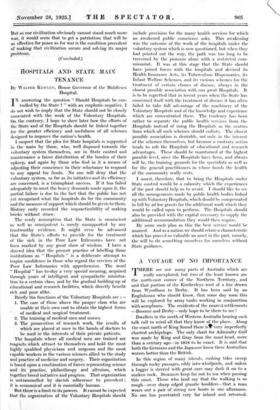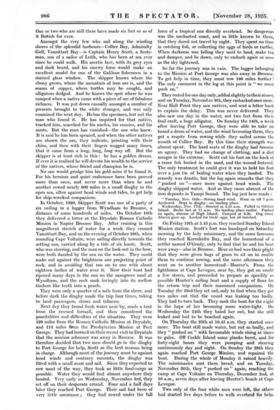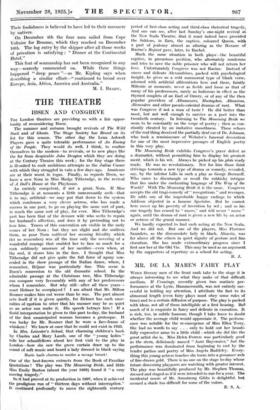A VOYAGE OF NO IMPORTANCE
THERE are not many parts of Australia which are really unexplored, but two of the least known are the north-east corner of the Northern Territory, and and that portion of the Kimberleys west of a line drawn from Wyndham to Derby. It has been said by an Englishman who should know, that some day soon this will be explored by army tanks working in conjunction with aeroplanes. The residents of the nearest settlements —Broome and Derby—only hope to be there to see I - - Dwellers in the north of Western Australia hearing such talk call to mind-all that they know of the place. Along the coast north of King Sound there-is" very imperfectly 'charted archipelago. - The only chart- for Admiralty Gulf was made by King and Gray from the masthead; more than a century ago—in 1818 to be exact. It is said that both the Germans and the Japanese know these Australian waters better than the British. • In this region of many islands, rushing tides sweep through rocky passages, eddy into whirlpools, and unless a lugger' is steered with great care may dash it on to a _ sunken rock. Steamers keep far out to sea when passing this coast. Those who land say that the walking is so . rough-0*er sharp edged granite boulders—that a man -*ears out a pair of strong new boots in one afternoon. No one has penetrated very far inland and returned. One or two who are still there have made six feet or so of it British for ever.
Amongst the very few who sail along the winding shores of the splendid harbours—Collier Bay, Admiralty Gulf, Vansittart Bay—is Captain Henry Scott, a Scots- man, son of a sailor of Leith, who has been at sea ever since he could walk. His ascetic face, with its grey eyes and dark beard, and his sinewy form would make an excellent model for one of the Galilean fishermen in a stained glass window. The skipper knows where the ebony grows, where the mountain of iron ore is, and the seams of copper, where turtles may be caught, and alligators dodged. And he knows the spot where he was camped when a native came with a piece of ore of fabulous richness. It was put down casually amongst a number of presents brought to the white stranger, and was only examined the next day. He has the specimen, but not the man who found it. He has inquired for that native, tracked him, searched for his uncles, his cousins, and his aunts. But the man has vanished—the one who knew. It is said he has been speared, and when the other natives are shown the ore, they indicate, pointing with their chins, and then with their fingers wagged many times, that it came from a long, long, long way off. But the skipper is at least rich in this : he has a golden dream. If ever it is realized he will devote his wealth to the service of the natives, whose friend and champion he is.
No one would grudge him his gold mine if he found it. For his heroism and quiet endurance have been proved more than once, and never more than when he and another rowed nearly 800 miles in a small dinghy in the open sea, often against head winds and tides, to get help for ship-wrecked companions.
In October, 1920, Skipper Scott was one of a party of six sailing in a lugger from Wyndham to Broome, a distance of some hundreds of miles. On October 19th they delivered a letter at the Drysdale Roman Catholic Mission in Napier Broome Bay. After cruising in this magnificent stretch of water for a week they crossed Vansittart Bay, and on the evening of October 28th, when rounding Cape Voltaire, were sailing directly towards the setting sun, carried along by a tide of six knots. Scott, who was steering, and the man on the look-out in the bow, were both dazzled by the sun on the water. They could make out against the brightness one projecting point of rock, and in avoiding that ran on to one with about eighteen inches of water over it. Now their boat had ripened many days in the sun on the mangrove mud at Wyndham, and the rock sank lovingly into its mellow timbers like teeth into a peach.
They were only a quarter of a mile from the shore, and before dark the dinghy made the trip four times, taking to land passengers, stores and tobacco.
Next day they found fresh water near by, made a tent from the rescued foresail, and then considered the possibilities and difficulties of the situation.- They were 120 miles from -the Roman Catholic Mission at Drysdale, and 114 miles Nom the Presbyterian Mission at Port George. They had learned on their recent visit to Drysdale that the mission schooner was away in Broome. It was therefore decided that two men should go in the dinghy to Port George for help, Scott as the. best seaman being in charge. Although most of the journey must be against head winds and contrary currents, the dinghy was fitted with a small mast and sail. Since they expected to row most of the way, they took as little food-cargo as possible. Water they would find almost anywhere they landed. Very early on Wednesday, November 3rd, they set off on their desperate errand. Four and a half days later they reached Port George. Their sail had been of very little assistance ; they had rowed under the full force of a tropical sun directly overhead. So dangerous was the uncharted coast, and so little known to them, that they dared not travel by night. They spent no time in catching fish, or collecting the eggs of birds or turtles. When darkness was falling they used to land, make tea and damper, and lie down, only to embark again as soon as the sky lightened. - So far the journey was in vain. The lugger belonging to the Mission at Port George was also away in Broome. To get help in time, they must row 180 miles further ! The only comment in the log at this point is " we must push on."
They rested for one day only, added slightly to their stores; and on Tuesday, November 9th, they embarked once more. Near Hall Point they saw natives, and sent a letter back to explain the delay. This was never delivered. They also saw one day in the water, not two feet from their frail craft, a huge alligator. On Sunday the 14th, a week after leaving Port George, they were able to take on board a drum of water, and the wind favouring them, they got a respite from rowing while they sailed across the mouth of Collier Bay. By this time their strength was almost spent. The hard seats of the dinghy had become an agony. They had no change of clothing, and a diet meagre in the extreme. Scott cut his foot on the back of a razor fish buried in the sand, and the wound festered. The only treatment he could give it was to hold his foot over a jam tin of boiling water when they landed. The remedy was drastic, but the log again remarks that they " pushed on "—once more against head winds. The dinghy shipped water. And so they came abreast of the iron deposits in Yampi Sound. The log just here reads :
" Tuesday, Nov. 16th.—Strong head wind. Went on till 7 p.m. Anchored. Slept in dinghy—no landing place.
Wednesday, Nov. 17th.--Started at 4.45 a.m. Pulled to Gibbon Island. Broke fast at 11 a.m. No landing place-earlier: Pushed on again, abreast of High Island. Camped at 6.30. Dog tired„ Almost gave up. Looked for birds' eggs, but all hatched.
On Friday 19th at 5.45 p.m. they reached Sunday Island Mission station. Scott's foot was bandaged on Saturday morning by the lady missionary, and the same forenoon they reached Karrakalto Bay, and the homestead of a settler named O'Grady, only to find that he and his boat were away—also in Broome. Here so bad was their plight that they were given bags of grass to sit on to enable them to continue rowing, and the same afternoon they went on to another homestead—Hunter's. From the lighthouse at Cape Levegue, near by, they got on credit a few stores, and proceeded to prepare as speedily as possible Hunter's sailing boat and a supply of flour for the return trip and their marooned companions. On Tuesday the 23rd they set sail, only to find when they got two miles out that the vessel was leaking too badly. They had to turn back. They sank the boat for the night in the hope of her becoming more water-tight. On Wednesday the 24th they baled her out, but she still leaked and had to be beached again.
On Thursday the 25th at 10.45 a.m. they started once more: The boat still made water, but not so badly, and they " pushed on " with favourable winds rising at times to gales. Off Cockle Island some planks burst, and for forty-eight hours they were pumping and steering continuously day and night. On Sunday the 28th they again reached Port George Mission, and repaired the boat. During the whole of Monday it rained heavily. The missionaries sent them bread, and on Tuesday, November 30th, they " pushed on " again, reaching the camp at Cape Voltaire on Thursday, December 2nd, at 10 a.m., seven days after. leaving Hunter's beach at Cape Levegue.
Two only of the four white men, were left, the others had started five days before to walk overland for help. Their foolishness is believed to have led to their massacre by natives. . On December 4th the fOur men sailed from Cape Voltaire for Broome, whiCh they reached on December 16th. The log entry by the skipper after all those weeks of privation is satisfying : " Dinner at the Continental Hotel." - This feat of seamanship has not been recognized in any way=-scarcely commented on. While these things happened " deep peace "—as Mr. Kipling says when describing a similar effort—" continued to brood over Europe, Asia, Africa, America and Australia."
M. I. BRADY.
























































 Previous page
Previous page